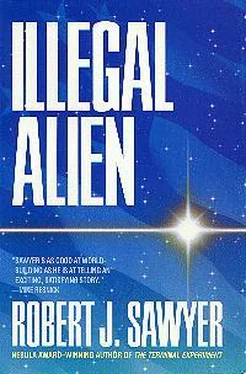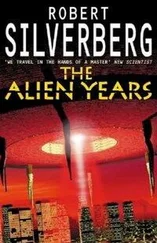“You eat the meat raw?” said Clete.
Hask nodded. “In ancient times we cooked animal flesh, but the reasons for cooking—to soften the meat, and to kill germs—do not apply to this product. Raw meat is much more flavorful…”
“That’s fine,” said Linda Ziegler, rising in the darkness. The bailiff pushed the pause button, and a still image of the floating Tosok, holding the now half-eaten piece of raw flesh in his hand, jerked and flickered on the monitors. The lights in the courtroom were brought back to full illumination; jurors and audience members rubbed their eyes.
Linda Ziegler then introduced into evidence one of the Tosok monofilament tools—the one that had belonged to Hask. There was no way to demonstrate that it was the specific one that had been used in the murder; forensics had been unable to find any evidence of that, and so she didn’t bother pursuing this line of questioning.
Of course, Hask possessed a new monofilament tool now; the mothership had dozens in its stores. A smaller version of the Tosok meat factory had been installed at Paul Valcour Hall; Hask needed one of the tools in order to feed himself, and Dale had successfully argued that one accused of killing with a knife is normally not denied access to cutlery.
Still, there was no doubt that the shipboard videotape, and the presentation of Hask’s cutting tool in court, had a huge impact on the jury.
And so, with smug satisfaction, Linda Ziegler returned to her seat and said, “Your Honor, the People rest.”
Hask and Frank had returned with Dale to Dale’s twenty-seventh-floor office. As soon as they arrived, though, Hask excused himself to use the bathroom. Like humans, Tosoks eliminated both solid and liquid waste, and with some difficulty they could make use of human toilets.
Once Hask had left the room, Frank leaned forward in his usual easy chair.
“Ziegler’s case was quite devastating,” he said. “What does our shadow jury say?”
Dale heaved his massive bulk into his leather chair and consulted a report Mary-Margaret had left on his desk. “As of this moment they’re voting unanimously to convict Hask,” he said with a sigh.
Frank frowned. “Look, I know you said we shouldn’t put Hask on the stand, but at this stage surely the real jury will be expecting to hear from him.”
“Possibly,” said Dale. “But Pringle will tell them that the defendant is under no obligation to testify; the entire burden is on prosecution. That’s part of CALJIC. Still…”
“Yes?”
“Well, this is hardly a normal case. You know what it says in the charge—‘did willfully, unlawfully, and with malice aforethought murder Cletus Robert Calhoun, a human being.’ In previous cases, it always seemed funny to me that they specify a ‘human being,’ but that is the key point in this case. The deceased is human, and the defendant is not—and the jury might well feel the prosecution has less of a burden in this case.” He waved the report at Frank. “That seems to be what our shadow jury is saying, anyway: if they make the wrong verdict, well, it’s not as though a human being would end up rotting in jail. If we can put Hask on the stand, and convince the jury that he’s every bit as much a person, every bit as real and sensitive as anyone else, then they may decide the way we want them to. The key, though, is to get them to like Hask.”
“That’s not going to be easy,” said Frank, shaking his head. Late-afternoon sunlight was painting the room in sepia tones. “I mean, we can’t win the jurors over with Hask’s smile, or anything like that—he physically can’t smile, and frankly, those rusty dental plates give me the willies. And shouldn’t a good defendant show more horror when crime-scene photos are displayed? I was hoping the Tosok taboo about internal matters would have worked in our favor there, but all Hask did was wave that topknot around in various patterns. The jury will never understand what those mean.”
“Don’t underestimate juries,” said Dale. “They’re a lot smarter than you might think. I’ll give you an example: I once handled a personal-injury case; not my normal thing, but it was for a friend. Our position was that the reason the person had been injured was because the car’s seat belt was faulty. Well, during our case, every time I mentioned that, I took off my glasses.” He demonstrated. “See? After I’d done that a few dozen times, the jury was conditioned. Then, whenever the automaker’s lawyer tried to point out alternative possible causes for the accident, I’d just take off my glasses. Never said a word, see, and there’s nothing in the transcript. But I’d take off my glasses, and the jury would be reminded of the faulty seat belt. We won 2.8 million in that case.”
“Wow.”
“If the jury can learn that ‘glasses coming off’ means ‘defective seat belt,’ it can also learn that ‘topknot waving side to side’ means Tosok laughter, or that ‘topknot lying flat’ means Tosok revulsion. Don’t worry, son. I think our jury knows Hask and the other Tosoks a lot better than you think they do.”
“So then we should put Hask on the stand.”
“Maybe… but it still worries me. Nine times out of ten, it’s a disaster, and—”
The door to Dale’s office opened, and Hask strode in. “I wish to testify,” he said at once, lowering his weight onto the single Tosok chair.
Dale and Frank exchanged glances. “I advise against it,” said Dale.
Hask was silent for a moment. “It is my decision to make.”
“Of course, of course,” said Dale. “But you’ve never seen a criminal case before; I’ve seen hundreds. It’s almost always a mistake for the defendant to take the stand.”
“Why? What chance is there that they will find me innocent if I do not testify?”
“No one ever knows what a jury is thinking.”
“That is not true. Your shadow jury has already voted to convict me, has it not?”
“No, it hasn’t.”
“You are lying.”
Dale nodded. “All right, all right. But even if it has, taking the stand is almost always the wrong move. You only do that when you have no other choice.”
“Such as now,” said Hask. As always, his natural voice rose as the words were spoken, making it impossible to tell if it was a question or a statement.
Dale sighed again. “I suppose. But you know that Linda Ziegler will let to cross-examine you?”
“I understand that.”
“And you still want to do it?”
“Yes.”
“All right,” said Dale, resigning himself to it. “But we’ll put you on the stand first.”
“Why first?” asked Hask.
“Because if Linda eviscerates you—forgive the metaphor—we’ll have the rest of our case-in-chief to try to recover.” Dale scratched his chin. “We should talk about your testimony—figure out what you’re going to say.”
“I am going to tell the truth, of course. The truth, the whole truth, and nothing but the truth.”
Dale raised his eyebrows. “Really?”
“You cannot tell, can you?” said Hask.
“Tell that you’re innocent? Of course I believe that, Hask, but—”
“No, tell if I am telling the truth.”
“What? No. Aren’t you?”
Hask fell silent.
There was an even bigger-than-normal crowd of reporters outside the Criminal Courts Building the next morning. Many dozens of reporters shouted questions at Dale and Frank as they entered, but Dale said nothing. Inside the courtroom, the excitement was palpable.
Judge Pringle came in, said her usual good morning to the jurors and lawyers, and then looked at Dale. “The defense may now begin its case-in-chief,” she said.
Dale rose and moved to the lectern. He paused for a moment, letting the drama build, then, in that Darth Vader voice of his, he boomed out, “The defense calls Hask.”
Читать дальше











